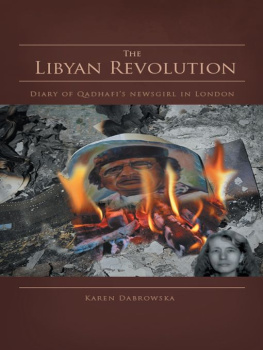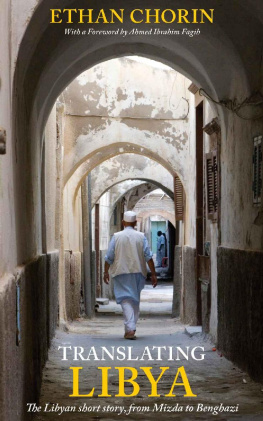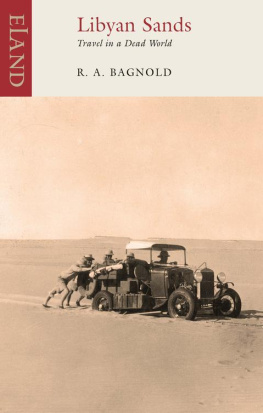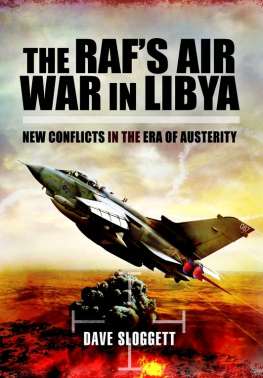Heart stopping. A bullet-by-bullet account of one mans journey from Ireland to Libyas International Brigade
Sam Kiley, Middle-East correspondent for Sky News and author of Desperate Glory
Housam Sam Najjair was born and grew up in the suburbs of Dublin. His father came to Ireland from Tripoli as a student in the 1970s, where he met and married Sams mother, Joanna Golden, daughter of Geoffrey Golden and Maire ODonnell, two famous Abbey Theatre actors.
From the age of nine, Sam lived with his family in Libya for three years before returning to Ireland. By sixteen, he had moved out of home, having been expelled from school. He worked in restaurants and in the Liberty Market and, at nineteen, took over a small restaurant in Dublin city before returning to Tripoli for two years. There, he worked for a diamond jeweller and in a travel agency that specialised in desert and mountain trips. He returned to Dublin at the age of twenty-one and worked in construction for several years before his fateful decision to fight against Gaddafi and help in the liberation of Libya.
SOLDIER FOR A SUMMER
ONE MANS JOURNEY FROM DUBLIN TO THE FRONTLINE OF THE LIBYAN UPRISING
SAM NAJJAAR

Copyright 2013 Housam Najjair
The right of Housam Najjair to be identified as the Author of the Work has been asserted by him in accordance with the Copyright, Designs and Patents Act 1988.
First published in Ireland in 2013 by
HACHETTE BOOKS IRELAND
All rights reserved. No part of this publication may be reproduced, stored in a retrieval system, or transmitted, in any form or by any means without the prior written permission of the publisher, nor be otherwise circulated in any form of binding or cover other than that in which it is published and without a similar condition being imposed on the subsequent purchaser.
For reasons of privacy and to protect identities, some names and identifying details have been changed.
Cataloguing in Publication Data is available from the British Library.
ISBN 978 1444 743 85 2
Hachette Books Ireland
8 Castlecourt Centre
Castleknock
Dublin 15, Ireland
A division of Hachette UK Ltd
338 Euston Road, London NW1 3BH
www.hachette.ie
Two things in my life have transformed me above all else becoming a father and surviving a war.
I dedicate this book of survival to my beautiful daughter, Layla.
They shall be spoken of among their people,
The generations shall remember them,
And call them blessed;
But I will speak their names to my own heart
In the long nights
from The Mother by Pdraig Pearse
It is little I would care, said Cuchulain, if my life were to last one day and one night only, so long as my name and the story of what I had done would live after me.
from Cuchulain of Muirthemne by Lady Augusta Gregory

Contents

When tyranny becomes law, rebellion becomes a duty
Inspirational motto
October 2011, Portobello, Dublin
My minds all over the place, jumping from scene to scene, cutting back and forth across the many different things that have happened to me in the past four months the amazing people Ive met, the intense training Ive been through, the life-threatening battles Ive survived and the heartbreaking suffering Ive witnessed. There have been emotional lows that Ive struggled through alone and highs of excitement that Ive shared with others. All of it totally unimaginable even six months ago when I sat in this very apartment, watching the news bulletins about the escalating trouble in Libya. All of it rushing through my mind now, in a storm of memories, flashbacks and stories.
The decision to go
The Chatterbox caf, just beside where I live on Portobello Road, was run by a Libyan friend of mine, Mustafa Al-Ahimar, and because I didnt have an internet connection in my apartment, Id drop in regularly, both to surf the web and to meet up with friends. Wed sit in a line at the computers, shoulder to shoulder, updating our Facebook pages, chatting in Arabic, drinking strong coffee and stepping outside regularly for a smoke. It was a typical gathering spot, but with a particularly Libyan feel to it.
The atmosphere was always light-hearted and easy-going at least it was until February 2011. When the Arab Spring erupted in Libya and some local demonstrations flared up in the east of the country, all that changed changed utterly, as Yeats put it.
I heard other customers asking Mustafa, who everyone knew was anti-Gaddafi, how events in Libya were unfolding. The odd comment about the possibility of this being the end for Gaddafi crept into conversations. Sceptically, I started looking into what was going on in more detail, and, before I knew it, me and my friends had stopped talking about our night lives in Dublin and were suddenly only thinking about life in Libya. What was going to happen in our country? How would Gaddafi react to calls for him to step down after forty-two years? Every day, we trawled through social media sites for updates about what was happening on the ground, we sent each other links to YouTube clips and talked non-stop about what the latest news reports were saying.
At the time, my main concern was the unity of the country. I worried about Libya becoming like Iraq, descending into a nightmare playground for international warmongers keen for better access to oil. I prayed that the protests wouldnt escalate into some kind of horror of violence and destruction.

Colonel Gaddafi had ruled Libya since 1969, when he orchestrated a military coup against King Idris. Although I was aware of the corruption in his regime, I was relatively tolerant of his rule because the Libyan side of my family wasnt directly affected by it. When I was young, I took the attitude that maybe Gaddafis regime was a necessary evil, something that Libya had to suffer in order to remain united and to help it prosper.
Libya was a rich country and enough people did well from its resources to pull Gaddafi through for a long time. For the rest, the less fortunate people, Gaddafi was able to put on a display of trying to do what was right for Libya. For many people, his supposedly humble origins combined with his confidence created a convincing picture of a leader. His early success in getting a better price for Libyan oil, and thereby improving the infrastructure and healthcare in the country for a time, made him very popular. His apparent pride in Libya and in Africa even though he expressed this in strange way was also appealing to many people. In name at least, he gave the impression of supporting democratic principles of government, and his anti-imperialist and socialist talk gave him credibility with a lot of ordinary people.
But there were other ordinary people like my sisters husband Mahdi al-Harati, who had a very different view of him, who knew very early on that all his fine words were just talk and, in fact, a big cover-up for something fundamentally rotten. When you think how important education is to a democratic society and of how relatively little Gaddafi did to improve the education system of the country, you can start to see the telltale signs of the oppression that Gaddafi subtly but surely imposed on Libya for forty years.









